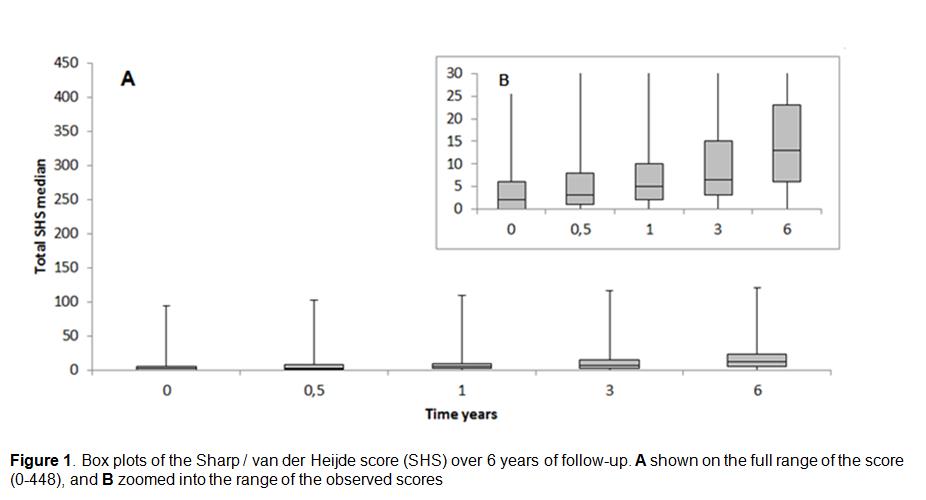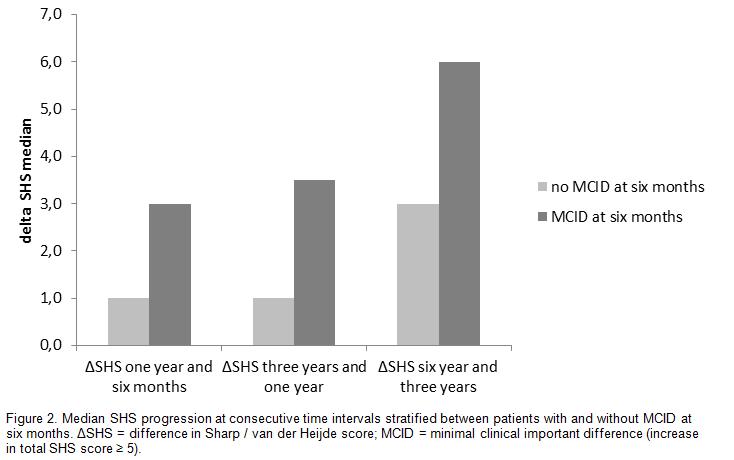Session Information
Date: Wednesday, November 16, 2016
Title: Rheumatoid Arthritis – Clinical Aspects VII: The Impact of Treating to Target
Session Type: ACR Concurrent Abstract Session
Session Time: 11:00AM-12:30PM
Background/Purpose: Implementation of treat-to-target (T2T) in Rheumatoid Arthritis (RA) leads to limited radiological damage during follow-up of 3 years. Questions are whether these results are maintained over time and whether patients with progressive radiological damage can be recognized early. This study describes the 6 years radiological outcomes of patients with early RA following the implementation of T2T in daily clinical practice.
Methods: In the Dutch Rheumatoid Arthritis Monitoring tight control cohort I, patients with early RA were treated according to a T2T step-up strategy starting with methotrexate monotherapy. Radiographs of hands and feet were obtained at baseline, after 6 and 12 months, and every 3 years thereafter. Primary outcome was the change in median Sharp/vanderHeijde score (SHS) of the total cohort using Friedman’s repeated-measures analysis of variance on ranks with signed-rank post hoc Wilcoxon tests. Secondary outcomes were 1) median individual change in SHS scores at different time intervals, 2) percentages of patients with at least minimal clinical important difference in SHS (MCID; increase ≥ 5 SHS points) between consecutive time moments and baseline. Mann-Whitney U test was used to test the difference in radiological progression between patients with and without MCID between 6 months and baseline.
Results: Data of 221 patients were used (78% fulfilling the ACR 1987 criteria). Within the first year of treatment 77% reached remission or low-disease activity (Disease Activity Score in 28 joints ≤ 3.2) and this percentage remained stable during 6 years of follow-up. Median (IQR) total SHS score increased from 2.0 (0.0–7.0) at baseline to 12.0 (6.0–22.0) at 6 years of follow-up (P<0.001) (Figure 1). The median (IQR) of the individual SHS progression rates per time interval were as follows: 2.0 (1.0–4.0) between 1 year and baseline, 2.0 (0.0–4.0) between 3 years and 1 year, 3.0 (1.0–5.0) between 6 years and 3 years (P<0.001). Percentages of patients with at least MCID in SHS scores after 6 months, 1 year, 3 years and 6 years were 12.8%, 22.3%, 44.9% and 76.0% respectively. Patients with MCID between 6 months and baseline had significantly more radiological progression during further follow-up than patients without (Figure 2).
Conclusion: Maintaining strict treat-to-target in early RA in daily clinical practice results in only minor radiological progression in long-term follow-up. Most joint damage occurs in the first year of treatment. Patients with early important clinical radiological progression had significantly more joint damage during further follow-up.
To cite this abstract in AMA style:
Versteeg LGA, Steunebrink LMM, Kuper IH, Vonkeman HE, ten Klooster PM, van der Bijl AE, van de Laar MAFJ. Early Radiological Progression in Rheumatoid Arthritis Leads to More Long-Term Joint Damage in Daily Clinical Practice; Six Year Radiological Outcomes of a Strict Treat-to-Target Cohort in the Netherlands [abstract]. Arthritis Rheumatol. 2016; 68 (suppl 10). https://acrabstracts.org/abstract/early-radiological-progression-in-rheumatoid-arthritis-leads-to-more-long-term-joint-damage-in-daily-clinical-practice-six-year-radiological-outcomes-of-a-strict-treat-to-target-cohort-in-the-netherl/. Accessed .« Back to 2016 ACR/ARHP Annual Meeting
ACR Meeting Abstracts - https://acrabstracts.org/abstract/early-radiological-progression-in-rheumatoid-arthritis-leads-to-more-long-term-joint-damage-in-daily-clinical-practice-six-year-radiological-outcomes-of-a-strict-treat-to-target-cohort-in-the-netherl/


